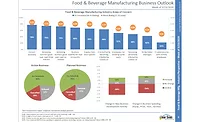What’s on the Minds of Food and Beverage Company Executives?
According to a recent survey, food and beverage executives are concerned about the potential effect of product recalls on their company’s reputation. More than 40 percent indicated product quality was a major risk and 45 percent indicated maintaining product recall capabilities is a priority for them. In response, a majority of companies are placing considerable focus on ingredients and supply chain tracking. But even with these efforts, only roughly one-third are confident in their current safety and recall strategies.
The survey was conducted by McGladrey LLP, a provider of assurance, tax and consulting focused on the middle market. Nearly 180 executives, owners and decision makers at food and beverage companies with annual revenues between $10M and $1B participated in the survey. Respondents included growers, manufacturers/processors, distributors and retailers.
Data Safety Continues To Be a Top Concern
Technology security also was an area where executives lacked certainty, according to the survey results. Less than half were confident in the safety of their data and systems. Based on the work of companies that have more trust in their systems, food and beverage companies indicated reinforcing their cyber security through enhanced employee security protocols and installing new or upgraded hardware were top strategies to combat breach concerns. The security and privacy consultants I’ve worked with tell me the best defense is a great offense when it comes to cyber security. Proactive planning is essential when it comes to protecting your company’s data.
Trying To Be All Things For All Consumers?
Executives also indicated improving profitability was a major focus, and in response, many companies are pursuing multiple strategies to address consumer tastes and a complex economy. Leaders indicated they would be employing four or more strategic marketplace trends to grow profits. These efforts included: diversifying product offerings, sales channels and marketing strategies; innovating to meet consumer tastes for more specialty products, including natural and organic, healthy or locally sourced food and drinks; as well as utilizing social media to promote these products.
Yet while addressing this endless list of consumer trends and marketplace possibilities might seem like a competitive way to stay viable in the market, could companies be spreading themselves too thin with their variety of strategies that may not make sense for their long-term growth objectives? Are they trying to be too many things for all consumers? Some companies may need to evaluate their aggressive product and sales initiatives and perhaps establish more focus to assure profitable growth. Staying competitive is one thing, but throwing the whole bowl of strategic spaghetti at the wall to see what sticks may not work for companies. Prioritization and focus could be the game changer for many food and beverage companies when it comes to their growth initiatives.
New Products and Lines Will Drive Growth
Despite these challenges, the future is reasonably optimistic for the food and beverage industry, and executives indicate that new products and line extensions are most likely to drive growth. Other risk-related findings and takeaways from the survey included:
• Quality, cost and speed are major operational focus areas for companies.
• A majority of survey participants are worried about competition, economic conditions and their own sales effectiveness.
• Human resources issues are increasing in scale and complexity for food and beverage businesses. Labor and wage concerns are impacting the ability to hire and retain top talent.
• Surprisingly, a majority of food and beverage company executives said they had no concerns with regulations, including regulatory areas, such as immigration reform, Occupational Safety and Health Administration requirements, tax requirements and Affordable Care Act and U.S. Food and Drug Administration regulations.
Learn more by downloading the McGladrey Food and Beverage Survey results.
Cristin Singer is a partner and food and beverage industry national practice lead with McGladrey LLP. In her role, she manages domestic and global engagements for both public and private organizations. Her food and beverage experience covers a cross section of the industry, including manufacturers, distributors and retailers. She also works closely with private equity groups active in investing in food and beverage-related companies.
Looking for quick answers on food safety topics?
Try Ask FSM, our new smart AI search tool.
Ask FSM →







